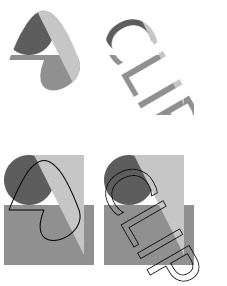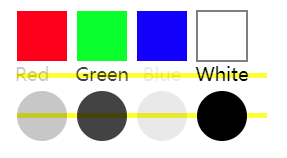10.1 裁剪路径
创建SVG文档时,可以通过制定感兴趣区域的宽度和高度建立视口。这会变成默认的裁剪区域,任何绘制在该范围外部的部分都不会显示。你也可以使用<clipPath>元素来建立自己的裁剪区域。
最简单的情形是建立一个矩形裁剪路径。在<clipPath>元素内是想要裁剪的<rect>。因为我们只想要它的坐标,所以这个矩形本身不显示。可以在<clipPath>元素内随意指定填充和笔画风格。应用时在要裁剪的对象上添加clip-path样式属性,值引用到<clipPath>元素即可。注意这个属性带有连字符且不是大写的,裁剪元素则是有大写字母且不带连字符。
裁剪矩形路径:
http://oreillymedia.github.io/svg-essentials-examples/ch10/clip_path.html
<clipPath>,顾名思义,应该可以让我们指定任意形式的路径用于裁剪。事实上<clipPath>元素也可以包含任意数量的基本形状,<path>元素或者<text>元素,下例展示了一组按照曲线路径裁剪的形状和同一组根据文本裁剪的形状
http://oreillymedia.github.io/svg-essentials-examples/ch10/complex_clip_path.html
<svg width="500" height="500" viewBox="0 0 500 500" xmlns="http://www.w3.org/2000/svg" xmlns:xlink="http://www.w3.org/1999/xlink"> <defs> <clipPath id="curveClip"> <path id="curve1" d="M5 55 C 25 5,45 -25,75 55,85 85,20 105,40 55 Z" style="stroke: black;fill:none;"> </clipPath> <clipPath id="textClip"> <text id="text1" x="20" y="20" transform="rotate(60)" style="font-family: 'Liberation Sans';font-size:48pt;stroke:black;fill:none;"> CLIP </text> </clipPath> <g id="shapes"> <rect x="0" y="50" width="90" height="60" style="fill:#999;"/> <circle cx="25" cy="25" r="25" style="fill:#666;"/> <polygon points="30 0 80 0 80 100" style="fill:#ccc;"/> </g> </defs> <!-- 绘制曲线裁剪路径 --> <use xlink:href="#shapes" style="clip-path:url(#curveClip);" /> <!-- 绘制文本裁剪路径 --> <use transform="translate(100,0)" xlink:href="#shapes" style="clip-path:url(#textClip);" /> <g transform="translate(0,150)"> <use xlink:href="#shapes" /> <use xlink:href="#curve1" /> </g> <g transform="translate(100,150)"> <use xlink:href="#shapes" /> <use xlink:href="#text1"> </g> </svg>

上例的裁剪路径坐标被指定为用户坐标。如果想根据对象的边界框来表示坐标,设置clipPathUnits为objectBoundingBox即可(默认值为userSpaceOnUse)。下例使用路径裁剪在任意对象上生成一个圆形或者椭圆窗口。
<!-- 应用objectBoundingBox的clipPathUnits --> <svg width="500" height="500" viewBox="0 0 500 500" xmlns="http://www.w3.org/2000/svg" xmlns:xlink="http://www.w3.org/1999/xlink"> <defs> <clipPath id="circularPath" clipPathUnits="objectBoundingBox"> <circle cx="0.5" cy="0.5" r="0.5" /> </clipPath> <g id="shapes"> <rect x="0" y="50" width="100" height="50" style="fill:#999;"/> <circle cx="25" cy="25" r="25" style="fill:#666;"/> <polygon points="30 0 80 0 80 100" style="fill:#ccc;" /> </g> <g id="words"> <text x="0" y="19" style="font-family: 'Liberation Sans';font-size:14pt;"> <tspan x="0" y="19">if you have form'd a circle</tspan> <tspan x="12" y="35">to go into</tspan> <tspan x="0" y="51">Go into if yourself</tspan> <tspan x="12" y="67">and see how you would dou.</tspan> <tspan x="50" y="87">—William Blake</tspan> </text> </g> </defs> <use xlink:href="#shapes" style="clip-path:url(#circularPath);"/> <use xlink:href="#words" transform="translate(110,0)" style="clip-path:url(#circularPath);"> </svg>

<marker>、<symbol>和<svg>元素都会定义其自身的视口,也可以使用overflow:hidden样式来裁剪视口内容。然而,如果内容的meet设置为preserveAspectRatio,视口可能比viewBox更大。要裁剪这个viewBox,就要创建一个<clipPath>元素,其中包含一个匹配viewBox最小x、最小y、宽度和高度的矩形。
10.2蒙版
SVG蒙版会变换对象的透明度。如果蒙版是不透明的,被蒙版覆盖的对象的像素就是不透明的;如果蒙版是半透明的,那么对象就是半透明的,蒙版的透明部分会使被覆盖对象的相应部分不可见。
我们用<mask>元素来创建蒙版。使用x、y、width和height属性指定蒙版的尺寸。这些尺寸默认按照objectBoundingBox计算。如果想根据用户控件坐标计算尺寸,设置naskUnits为userSpaceOnUse即可。
起始<mask>和结束</mask>标记之间使我们想要用作蒙版的任意基本形状、文本、图像或者路径。这些元素的坐标默认使用用户坐标控件表达。如果想要为蒙版内容使用对象边界框,设置maskContentUnits为objectBoundingBox即可(默认为userSpaceOnUse)。
SVG如何确认蒙版的透明度?即阿尔法的值。我们知道,每个像素由4个值描述,分别是红、绿、蓝颜色值和不透明度。
SVG使用如下公式:
(0.0125*red value + 0.7154 * green value +0.0721 * blue value)*opacity value
所有的值都是0到1之间的浮点数。
下例中,创建了黑色文本和黑色圆形,圆形由完全不透明的红、绿、蓝和白色正方形遮罩。文本和圆形被组合在一起,并且这个组合使用mask样式属性引用了对应的蒙版。背景中的水平黄色条演示了文本和圆形都是半透明的。
<!-- 不透明的颜色蒙版 --> <svg width="500px" height="500px" viewBox="0 0 500 500"> <defs> <mask id="redmask" x="0" y="0" width="1" height="1" maskContentUnits="objectBoundingBox"> <rect x="0" y="0" width="1" height="1" style="fill:#f00;"/> </mask> <mask id="greenmask" x="0" y="0" width="1" height="1" maskContentUnits="objectBoundingBox"> <rect x="0" y="0" width="1" height="1" style="fill:#0f0;"/> </mask> <mask id="bluemask" x="0" y="0" width="1" height="1" maskContentUnits="objectBoundingBox"> <rect x="0" y="0" width="1" height="1" style="fill:#00f;"/> </mask> <mask id="whitemask" x="0" y="0" width="1" height="1" maskContentUnits="objectBoundingBox"> <rect x="0" y="0" width="1" height="1" style="fill:#fff;"/> </mask> </defs> <!-- 显示颜色以演示相对亮度 --> <rect x="10" y="10" width="50" height="50" style="fill:#f00;"/> <rect x="70" y="10" width="50" height="50" style="fill:#0f0;"/> <rect x="130" y="10" width="50" height="50" style="fill:#00f;"/> <rect x="190" y="10" width="50" height="50" style="fill:#fff;stroke:black;"/> <!-- 用于演示透明度的背景内容 --> <rect x="10" y="72" width="250" height="5" style="fill:yellow;" /> <rect x="10" y="112" width="250" height="5" style="fill:yellow;" /> <g style="mask:url(#redmask);font-size: 14pt;text-anchor: middle;"> <circle cx="35" cy="115" r="25" style="fill:black;"/> <text x="25" y="80">Red</text> </g> <g style="mask:url(#greenmask);font-size: 14pt;text-anchor: middle;"> <circle cx="95" cy="115" r="25" style="fill:black;"/> <text x="95" y="80">Green</text> </g> <g style="mask:url(#bluemask);font-size: 14pt;text-anchor: middle;"> <circle cx="155" cy="115" r="25" style="fill:black;"/> <text x="155" y="80">Blue</text> </g> <g style="mask:url(#whitemask);font-size: 14pt;text-anchor: middle;"> <circle cx="215" cy="115" r="25" style="fill:black;"/> <text x="215" y="80">White</text> </g> </svg>

颜色、透明度和最终阿尔法值之间的关系并不直观,如果使用白色填充或者使用白色给遮罩内容描边,则上面公式中前半部分“颜色因子”结果为1,此时不透明度则是控制蒙版阿尔法值的唯一因素。
http://oreillymedia.github.io/svg-essentials-examples/ch10/alpha_opacity_mask.html
<!-- 只使用不透明度的蒙版阿尔法值 --> <svg width="500px" height="500px" viewBox="0 0 500 500"> <defs> <mask id="fullmask" x="0" y="0" width="1" height="1" maskContentUnits="objectBoundingBox"> <rect x="0" y="0" width="1" height="1" style="fill-opacity:1.0;fill:white;" /> </mask> <mask id="three-fourths" x="0" y="0" width="1" height="1" maskContentUnits="objectBoundingBox"> <rect x="0" y="0" width="1" height="1" style="fill-opacity:0.75;fill:white;" /> </mask> <mask id="one-half" x="0" y="0" width="1" height="1" maskContentUnits="objectBoundingBox"> <rect x="0" y="0" width="1" height="1" style="fill-opacity:0.5;fill:white;" /> </mask> <mask id="one-fourth" x="0" y="0" width="1" height="1" maskContentUnits="objectBoundingBox"> <rect x="0" y="0" width="1" height="1" style="fill-opacity:0.25;fill:white;" /> </mask> </defs> <g style="font-size: 14pt;text-anchor: middle;fill:black;"> <g style="mask:url(#fullmask);"> <circle cx="35" cy="35" r="25" /> <text x="35" y="80">100%</text> </g> <g style="mask:url(#three-fourths);"> <circle cx="95" cy="35" r="25" /> <text x="95" y="80">75%</text> </g> <g style="mask:url(#one-half);"> <circle cx="155" cy="35" r="25" /> <text x="155" y="80">50%</text> </g> <g style="mask:url(#one-fourth);"> <circle cx="215" cy="35" r="25" /> <text x="215" y="80">25%</text> </g> </g> </svg>

10.3 案例学习:为图形应用蒙版。
<!-- 图形内未应用蒙版的<image> --> <svg width="500px" height="500px" viewBox="0 0 500 500"> <defs> <font-face font-family="bakbatn"> <font-face-url xlink:href="kfont.svg#kfont-defn"/> </font-face> </defs> <!-- 绘制椭圆和文本 --> <use xlink:href="kwanghwamun.jpg" x="72" y="92" width="160" height="120" /> </svg>
解决方案是让照片的边缘淡出,使用径向渐变作为蒙版。下面代码添加到<defs>部分
<radialGradient id="fade"> <stop offset="0%" style="stop-color:white;stop-opacity:1.0" /> <stop offset="85%" style="stop-color:white;stop-opacity:0.5" /> <stop offset="100%" style="stop-color:white;stop-opacity:0.0" /> </radialGradient> <mask id="fademask" maskContentUnits="objectBoundingBox"> <rect x="0" y="0" width="1" height="1" style="fill:url(#fade);" / > </mask>
然后给<image>标记添加一个蒙版引用:
<image xlink:href="kwanghwamun.jpg" x="72" y="92" width="160" height="120" style="mask:url(#fademask);"/>